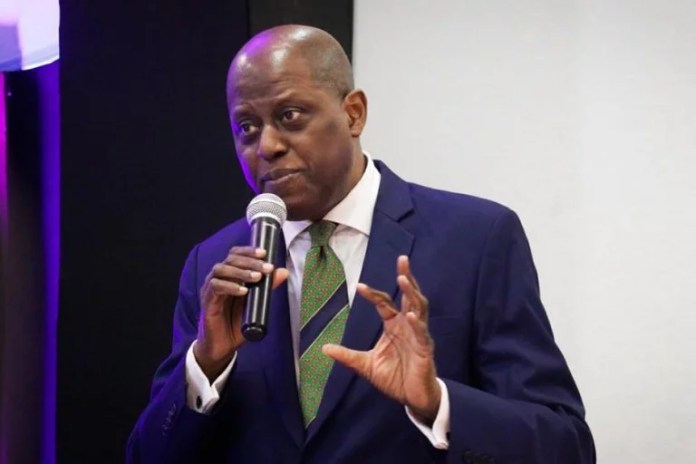Top Stories
FG Takes Fresh Action As Naira Slumps To 1,220/Dollar

The federal government yesterday announced plans to automate transactions in the entire foreign exchange market in order to close the wide arbitrage and punish naira speculators.
The Minister of Finance and Coordinating Minister for the Economy, Wale Edun, disclosed this in Abuja during the first-panel session at the 29th Nigeria Economic Summit.
He said all dealings in the forex market, from the official to the money changers where huge arbitrage has consistently occurred, would be thoroughly monitored and offenders fished out and punished.
This is as the naira weakened further against the dollar yesterday exchanging for N1,220 at the black market.
The dollar had crossed N1,000 at the unregulated market three weeks ago.
From September 27 to October 3, the dollar was still exchanging for N,1000 at the parallel market while stabilising at the investors and exporters (I&E) window.
This was not the first time that the dollar would hit N1000 in the black market, but it had often crashed within a few days.
This time around, the naira has continued to witness a free fall, having lost about 25 per cent value in the last three weeks.
The minister also disclosed during the NESG’s summit that President Bola Tinubu signed two executive orders last week.
“One of them is an executive order that allows forbearance for all the cash in the economy to come in and formally boost the money supply legally.
“There’s another executive order that allows domestic issuance of foreign currency issues so that it will allow incentive to provide that foreign exchange for whatever source,” he stated.
According to him, there is revamping of the foreign exchange market which will be unfolded as time goes.
He admitted that Nigeria’s foreign exchange market was not functioning effectively due to illiquidity and that the government was prepared to do everything required to change the status quo.
“Foreign exchange market will be simplified and reformed such that all legal and legitimate transactions will fall within the purview of the authorities and in the formal foreign exchange market. Anything outside that will be illegal, a criminal offence and will be punished,” he warned.
Earlier at the summit, President Tinubu promised to clear the foreign exchange contracts backlog that discouraged investors’ confidence.
He assured that his administration would honour all future foreign exchange contracts.
“I assure you we have a line of sight to the foreign exchange we need to refloat this economy. And we will get it,” Tinubu said.
It would be recalled that the CBN sold what is called forward contracts to several Nigerian businesses with the promise of dollars at an agreed price in future.
The banks opened Letters of Credit (LCs) on the back of the forward contracts which were then used to buy goods from foreign suppliers.
The CBN has, however, not settled the contracts since February 2023; meaning that there is a backlog of about $3bn, according to sources familiar with the matter.
The broader backlog, which includes unsettled foreign investors’ contracts, is estimated to be about $10 billion.
The CBN’s failure to clear the dollar backlog has put it in a very tight forex liquidity position and forced it to suspend several transactions, including school fees and Personal Travel Allowance applications.
Also speaking at the summit, CBN Governor Yemi Cardoso said going forward, the apex bank would take its objective of price stability “very seriously indeed.”
He said the plan is to have a foreign market that is fit for purpose and works for everybody, which can be predictable and with no opacity.
He stated: “We are going to come out with an elegant document that will tell you the rules,” the governor assured.
“We know a multi-trillion dollar economy is viable within a decade of serious reforms, consistent economic action and deliberate institutional reforms. A macroeconomic stabilisation programme supported by an aggressively scaled national security effort to halt all forms of syndicated and organised crime around crude oil and solid minerals and also a made-in-Nigeria agenda to make-in-Nigeria, two strategic drivers require urgent investment and a national job creation plan that drives the creation of huge volume of high-quality jobs, among other reforms.”
Chairman, NESG, Niyi Yusuf, said Nigeria could become a trillion-dollar economy if critical reforms were put in place.
Yusuf said the NESG was ready to support the government to model the tough choices required and the associated palliative measures to ameliorate the short-term impact of its policies and reforms on Nigerians.
He said this year’s summit was designed to address the current challenges facing the country with a view to providing viable solutions.
“The need for urgent strategic shifts that impact the ease and cost of doing business within a relatively short period is a matter of existential threat to the survival of enterprises and entrepreneurs.
“The low access to and increasing cost of FX, high cost of inventory, imported inputs, and operations, coupled with the diversity of taxes, continue to erode business balance sheets, with resultant contraction in production and employment, which the conference will have discourse on to address” he added.
Meanwhile, President Tinubu also assured that the federal government’s student loan scheme would begin in January 2024.
He said the scheme would end industrial actions in the country’s tertiary institutions.
The legislation gives Nigerian students the opportunity to have access to loans at interest-free rates.
“By January 2024, the new student loan programme must commence. To the future of our children and students we’re saying no more strikes,” the president said.
Help manufacturers with subsidy – Don
A university don and Lagos State chairman of the National Association of Small and Medium Enterprises (NASME), Prof. Adebayo Adams, told our correspondent that the dollar was out of control because of the failure of the government’s policy.
He said the floating of the naira was done without looking at the pros and cons. According to him, the government would have adopted the policy of subsiding the manufacturers of food items while floating the naira.
He said, “We don’t need to go to a prophet to tell us there is trouble in this country,” adding that the government must take concrete and firm decisions to arrest the fall.
“You are very correct that it is N1,220, that is the price now. All our manufacturers have all closed shop. Number one, they were fighting over diesel which has risen to over N1000, fuel has gotten to N650,” he said.
Adams said given that most manufacturers buy their raw materials from China, Asia and the Caribbean, he said the government should work out plans to ensure payment is made in the currency of the foreign countries, especially Yuan.
He added, “It is the policy that is not right. When you know you want to float the naira, let them subsidise what the people will take, especially the food items we are eating. If they had met every manufacturer and discussed subsiding their input, we would not have this crisis.
“We need to support the manufacturers, give them real subsidies. The rising dollar is a function of demand and supply. Let’s have an arrangement with the people in China, let us pay them in naira or Yuan. We don’t need to pay them in dollars. Whatever they are taking out of Nigeria, the containers must not go out empty, we should fill the containers with something else.”
He said this could be achieved when Nigeria begins to add value to their farm produce for export purposes in order to earn foreign currencies.
BDC operators speak
A Bureau De Change operator at Allen Avenue in Lagos, Hussain Sabo, said, “As I am talking to you, we sell dollars at N1,220 here. This is the price of today, we don’t know what will happen tomorrow. The naira may fall again or crash.”
Another BDC operator, Lawal Hussein, blamed the rapid fall on the inability of the CBN to supply dollars to the operators at the parallel market segment.
“Now, we’re not doing anything, a lot of our members are closing down because we don’t have any dollar to sell from the CBN. It’ll continue to fall because of the huge demand,” he said.


 News21 hours ago
News21 hours agoNIGERIAN BREWERIES PARTNERS OZA CARNIVAL

 Top Stories9 hours ago
Top Stories9 hours agoTinubu’s Aide Condemns Plan To Reinstall ‘Jesus Is Not God’ Banner In Lekki Mosque

 Top Stories4 hours ago
Top Stories4 hours agoBreaking: FIRS Announces Fresh Recruitment, See Eligibility Criteria, Application Deadline

 News9 hours ago
News9 hours agoPetrol To Sell ₦935/Litre From Today – IPMAN

 Top Stories10 hours ago
Top Stories10 hours ago2025 Budget Cannot Address Nigeria’s Economic Challenges – Atiku

 News9 hours ago
News9 hours agoPresident Tinubu’s reforms not responsible for food stampedes – FG

 Top Stories7 hours ago
Top Stories7 hours agoPrimate Ayodele’s Prophecies For 2025

 Entertainment9 hours ago
Entertainment9 hours agoI will be more influential in Nigeria than UK – Tobi Adegboyega







